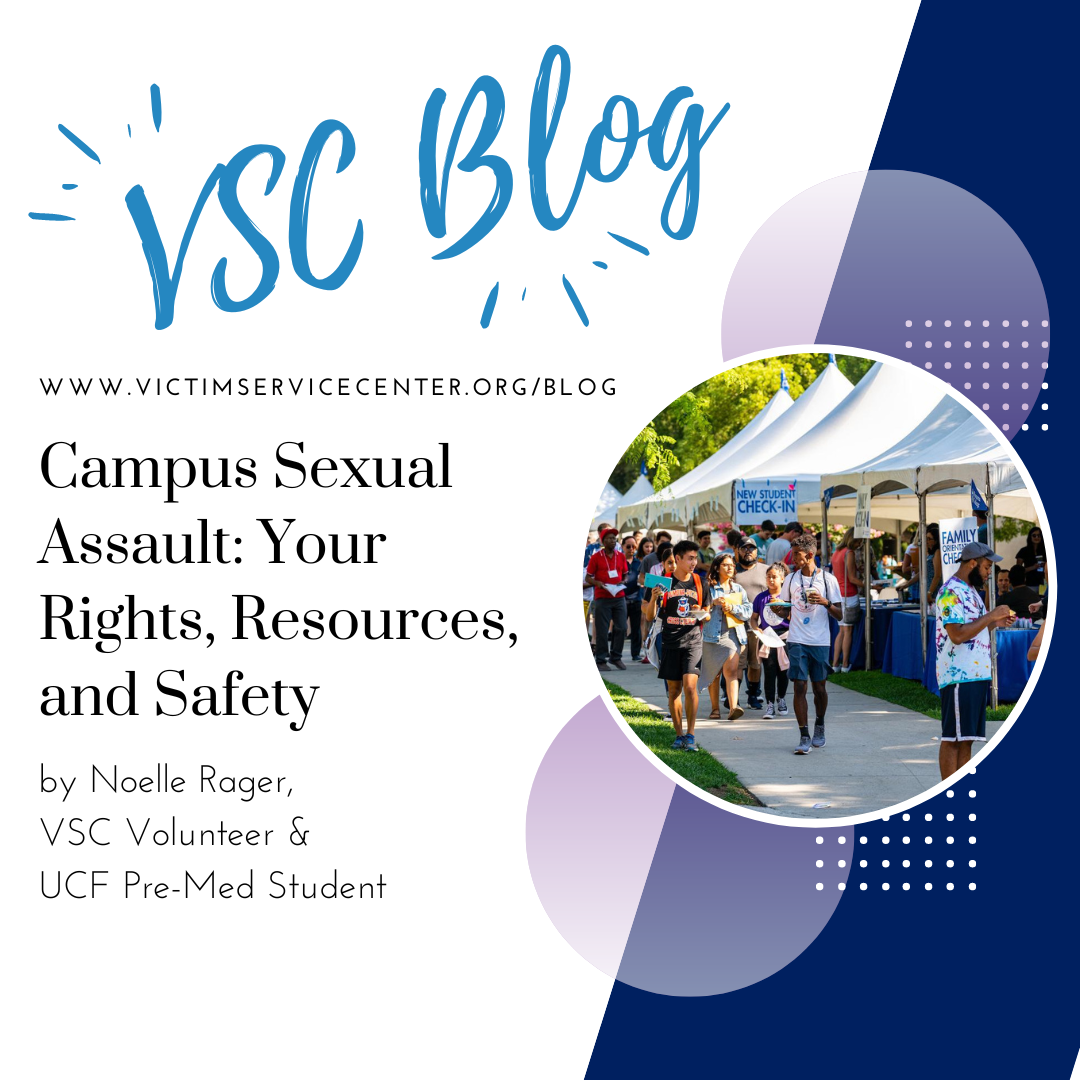by Jessica Honeycutt, Rollins College Clinical Mental Health Counseling Graduate Student and former VSC intern

Unlike the romantic comedies we all watch; the truth is that breaking up or being broken up with is never easy and frankly sucks. Whether you were the one broken up with or initiating the break up, there is a wide range of emotions that are associated with this change. And, unfortunately most of those emotions are not good or happy feelings. We now know from advances in neuroscience that a broken heart has profound effects on your mind and body. Our brains process relationship breakups in the same region that processes physical pain. While this does not mean that we feel physical pain within our body, like if we were to break a bone, but this is important to remember and allow room for self-compassion for the pain that you are feeling. Additionally, studies have proven that while the physical pain of breaking a bone is temporary, emotional pain processed in the brain tends to linger longer for even days, weeks, or months. For the remainder of this article, I will be referring to a break up as “when you break up with another person, another person breaks up with you, or all parties involved in the relationship agree to break up with no intention to continue the relationship at this time”. In other words, the relationship is over and done. It should also be addressed that this article will address healthy relationships, meaning that this article does not address abusive or domestic violent relationships. Resources for abusive relationships will be provided at the end of this article.
Mental Health Safety
It is always important to take care of yourself and your mental health, but this rings especially true during and after a break up. It has been found that previously unknown mental health diagnoses such as anxiety and depression can develop post break up and trigger hidden mental health conditions. This phenomenon is a theory called the “Diathesis-Stress Model”, which essentially explains how a person who has a predisposed tendency to develop a disorder (such as anxiety or depression) is affected after a stressful life event (such as a break up) and how that disorder can now come to the surface and present itself. But what’s important to remember is that there are steps you can take to better your mental health and become more resilient than ever.
Below are suggestions for self-care tips to take care of your mental health during and after a breakup:
- Acknowledge what you are feeling
- As previously discussed, a break up will bring up many emotions including the good, the bad, and the ugly. Take the opportunity to lean into those emotions and fully feel those ugly emotions. Expressing your true emotions is the first step to overcoming those emotions. Some common feelings include: relief, shock, acceptance, denial, grief, pain, betrayal, numb, embarrassment, sadness, happiness, confusion, and many more. Your emotions may present differently than what you have seen on TV or how your friends and family describe them. Keep true to yourself and express your emotions in your own individualized way. The beauty of this is that there is no right or wrong way to do this!
- Feel compassion for yourself
- Remember to be kind to yourself. Give yourself some self-love and compassion for what you have been through. A breakup is a major life transition and change, it is not meant to be taken lightly. During and after a break up you may notice that you are not functioning at your highest potential, and that is completely normal! No one is superman or superwomen, take this time to realize what you can and cannot do each day. This may need to re-evaluated daily, weekly, or monthly until you are feeling more yourself. Use the time in-between to reenergize, get to know your new self, and create a new normal.
- Stay social
- There is no reason why you should do this alone! We have an instinct to withdraw and isolate after a break up, when we should be seeking support from those around us. While a few Netflix binge nights with ice cream can be therapeutic, it should only be temporary. Isolation can lead to increased feelings of anxiety, difficulty concentrating, increased stress, and even physical problems such as addiction or heart conditions. Instead of isolating yourself, share your feelings and thoughts with those that you can trust. Family, friends, or co-workers can provide invaluable support to you throughout this difficult time. You may also want to consider joining a support group where you can talk with others who are going through your exact situation. Do not be afraid to ask for help if you need it!
- Look to the arts
- If you are having difficulties expressing yourself verbally, try expressing yourself through artistic mediums such as poetry, music, art, and more. Art has profound positive effects on our mental health and it is an incredible source of healing. Art is a safe and healthy outlet to relieve those stubborn and repressed emotions within yourself. Studies have proven that listening to music can lower your heart rate, reduce pain, and relieve stress. The act of creating art not only provides stress reducing effects and an outlet for our emotions, it increases our brain functioning and serotonin production. Serotonin is a powerful neurotransmitter known as the “happy brain chemical”. One of its many jobs is to help with mood stabilization. Higher levels of serotonin have been linked to lower levels of feelings of depression. Remember you do not need to be a professional artist, writer, or musician in order to reap the benefits of art therapy! Some ideas to help get your artistic juices flowing include: drawing or painting, making a breakup playlist, adult coloring books, photography, and more!
- Rearrange your living environment
- Take this time to declutter your life starting with your home. Brighten up your life and get rid of anything associated with your ex, whether you were living together or not. Instead of burning or throwing away their old clothes, use this opportunity to create good karma and donate them to local charities. Create a sanctuary for yourself and like the Marie Kondo method, throw away any item that does not bring joy into your life.
- Digital detox
- We are all guilty of aimlessly scrolling on our phone for hours. Create digital boundaries with yourself in order to lesson your viewing of your ex. It is important to also recognize the emotions that arise when you do see your ex on social media and create boundaries based on those gut reactions and emotions. Maybe you are not mentally ready to allow yourself to view your ex on social media yet and that is ok! Give yourself time to heal and grow and then reconsider your boundaries with social media.
- Don’t make drastic changes to yourself
- A break up is already a major life change, why add more drastic changes to your life at this moment. Besides the unfortunate bad haircuts, a lot of people fall into a self-criticism spiral following a break up. Getting rid of the old may feel that you need to change how things were or upgrade items you already have. Your bank account will thank you if you do not spend the extra money on an extravagant new car or new bangs from the top stylist. Remember that there is nothing wrong with you and there is nothing to “fix”. Learn to express gratitude for yourself and what you have around you.
- Start a new, different type of relationship
- Creating space for a new and healthy hobby can be so beneficial! Look at your current hobbies for new inspiration or try skills or hobbies you have always wanted to try! Try gardening, a new book, guitar, cooking classes, or teach your dog a new trick. Look for things you love to do, or have always wanted to do, with a new fondness and foster that relationship.
Physical Safety
Breakups always present a heightened sense of danger due to the heightened emotions associated. It is fundamentally important to always place yourself in a safe environment during and after a breakup. In abusive relationships, the most dangerous times for a partner is when the relationship is ending due to the threat of losing power and control. Whether you are breaking up with your partner or being broken up with, it is important to have a plan. Safety plans allow you to create a personalized and practical plan to help you avoid potentially dangerous situations and the best way to react when faced with the potential danger. If anything, safety planning empowers yourself with knowledge about how to act in different possible scenarios.
Below are some helpful and important points to think about during and after a break up:
- During the break-up:
- Remember that you do not owe them anything
- You owe yourself the peace of mind of being safe and you do not owe them an explanation, a face-to-face break up, another chance, or a returned phone call.
- If you decide to meet with them, take someone with you
- If you do plan on meeting with your partner face to face, try to have someone waiting in the car with you, waiting at the restaurant, or simply outside just in case. Always meet in public where there will be other people around and be insistent on not leaving the sight of at least one other set of eyes, even if it is a stranger. If you cannot have someone physically there with you, at least have someone on speed dial or on the phone when you go meet. I cannot stress this enough, always tell someone when and where you are going to meet with your partner, what time you are leaving and what time you expect to be home or leave.
- Know what you want to say and how to say it
- Vocalizing our emotions is hard enough. Expressing yourself eloquently during a breakup is hard and sometimes not a reality. Plus, it is so tempting to fall back into a relationship when you have not thoroughly thought about the break up. But through being prepared for a break up, you will have a better chance of expressing your true thoughts, emotions, and needs. Be sure that what you are saying makes clear sense. If you feel that you are unable to think in the moment, try making a list beforehand and read off of it. Most importantly, remember to be strong and stick with your decision!
- Remember that you do not owe them anything
- After the break-up:
- Be clear if you do not want any further contact
- This does not mean forever, but it might be best for you to take a break from seeing your ex. This is important to think of and/or address during or after the breakup. Maybe taking at least some time totally apart will help make the transition easier. Remember that you cannot change their behavior, but you can change your own.
- Decide if you should stay in touch
- This has to be one of the trickiest parts of a breakup! Navigating the waters of whether you should stay in touch or not is not an easy decision. Regardless of what you decide, this can always be renegotiated with yourself and/or if you chose to stay in touch with your ex. But choosing to limit contact either by a little or completely may help yourself move on faster or make the process a little less stressful.
- Consider avoiding common places you and your ex used to go
- Would you and your ex frequent the same grocery store? Did you both have a favorite bar or brunch spot? Maybe you both are members at the same gym? If the thought of running into your ex while aimlessly shopping scares you, maybe you should consider traveling outside of your normal routine. It should also be noted that avoiding some of the obvious heartache spots should also be avoided, such as your first date place or first kiss location. This change can be temporary or forever, who knows what new places you’ll end up loving!
- Be clear if you do not want any further contact
Technology Safety
We are all living in a society that requires technology to be a part of our daily lives. That being said, technology is often neglected during a break up. Other than deleting your ex off of social media and deleting his number, there are many more safety precautions people often forget about. Our wildly capable smart phones, tablets, computers, and other devices save information and details that we forget exists. Today, social media offers us the chance to remain connected in ways that we have never been able to before. You don’t have to be a technology wizard in order to remain safe during and after a break up.
Below is a quick list of things to be aware of during a relationship and after its over:
- Change your passwords
- If you have shared devices more times than not you have subconsciously subscribed for the password to be saved, so you do not need to type your password. Whether it is your passcode on your phone or email password, it is a good idea to change most (if not all) of your passwords post-breakup
- Block/Remove phone numbers
- This is completely up to you, but it might be a good idea right after a break up to block or remove your exes number from your cell phone. This way you limit the chances of getting in contact with them. If you feel that this is too drastic, you could always change their name in your phone to something that prompts you to stop contacting them like “Do Not Call”, “I Deserve Respect”, or “EX”.
- Update your privacy settings
- If you are like me, I rarely check my privacy settings on my phone, computer, social media accounts, etc. But I am here to tell you that it is worth the time to double check your privacy settings! On social media you can choose to block content from other users while remaining friends with them, share with selected people, block people from seeing certain content that you post, and more!
- Be aware of your location services
- This handy feature allows you to be on a map 24/7, access navigation and map services, and check in to local establishments. Certain computers, tablets, and phones have the accessibility to both turn on and turn off this feature. It is important to check which of your social media sites allow location services and which ones show you on a map 24 hours a day (like snapchat and find my friends).
- Turn off Check-ins
- While we might want to show our exes that we are having a blast without them, you might want to consider not checking into places when you go out. Whether you are going hiking or grabbing dinner with your friends, these check ins allow your ex to know what you’re doing and who you are hanging out with.
- Ask friends/family not to tag you
- Just like check-ins, having your friends and/or family tag you in pictures shows your ex who you are hanging out, where you are going, and frankly what you are up to post break up. Having these conversations with the individuals you are hanging out with is important, but if you are not comfortable telling them why you do not want to be tagged, you do not have to share why! Share as much or as little as you are comfortable with.
Final Thoughts
Everyone deserves the right to privacy and safety. Remember that this list is not exhaustive, but it presents important points to think about both during and after a break up. It is also important to remind yourself that this state of being is temporary. If you are feeling that you want and/or need to talk to someone about your situation, please feel free to call to seek professional help either through a mental health counselor or The Victim Service Center for further information.
Resources
- https://www.thehotline.org
- www.safehorizon.org/services/safety-plan/
- https://acisni.com/is-there-spy-software-on-my-cell-phone-how-to-detect-being-monitored/
- https://www.loveisrespect.org/for-yourself/safety-planning/
- https://www.thehotline.org/healthy-relationships/
As always, VSC remains a resource for those who experience violence or trauma. VSC provides free counseling, advocacy, safety planning, therapy and more to victims. We also have a 24/7 crisis helpline for those who need immediate resources and support (407) 500-HEAL.
If you’re planning to leave an abusive relationship you can also reach out to local domestic violence centers to assist you whether you need shelter or not. Here are a few of the local resources in Central Florida:
Orange County: https://www.harborhousefl.com/
Seminole County: http://safehouseofseminole.org/
Osceola County: https://www.helpnowshelter.org/




